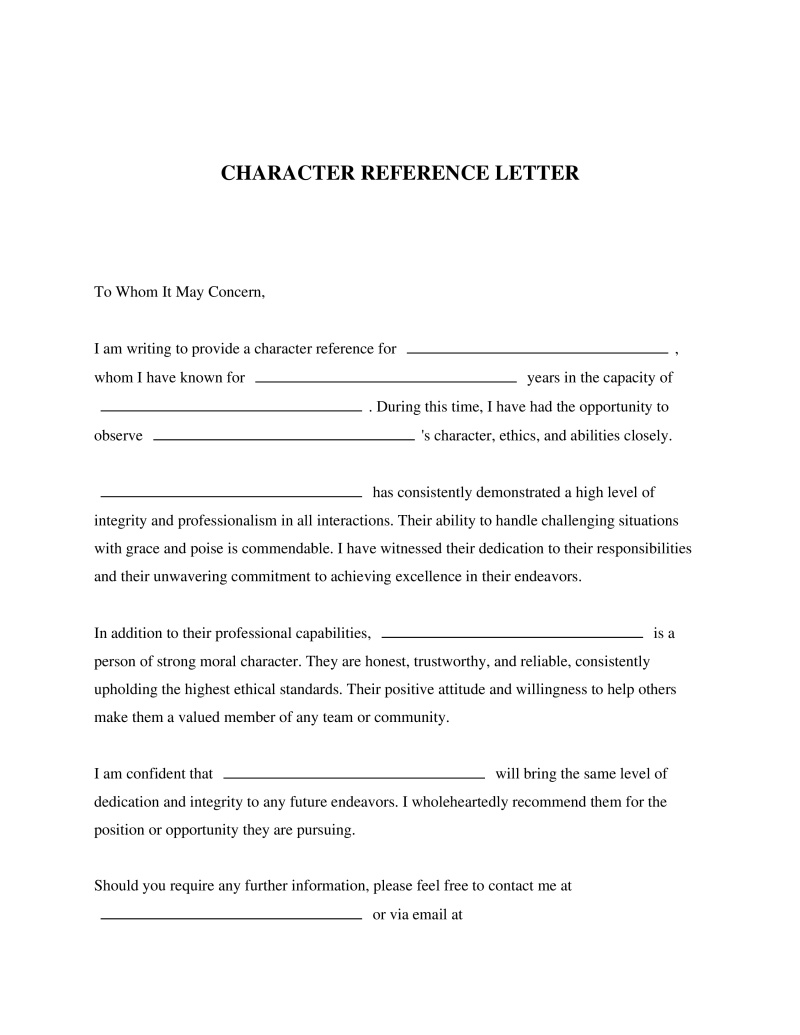A Character Reference Letter is a legal document that vouches for an individual's moral standing and personal qualities.
Referee Full Name
Write your full name as it appears on your legal documents, including your first name, middle name (if any), and last name. For example, if your name is John Michael Smith, write it exactly that way. This information is important because it will be used to identify you in legal matters.

Table of Contents
What is a Character Reference Letter?
A Character Reference Letter is a document often used in legal proceedings, employment applications, and academic admissions to provide insight into an individual's personal qualities, ethics, and integrity. This letter serves as a testament to the character of the person it's written about, offering a third-party perspective on their virtues and suitability for a particular role or situation. Typically, it is needed by individuals seeking to bolster their case in court, enhance their job application, or strengthen their college admission packet by demonstrating qualities that are not easily quantified on paper. The effectiveness of this letter lies in its ability to convey sincerity and personal experiences that attest to the character of the applicant.
Key Features
Important Provisions
- Introduction of the author, including their relationship to the subject and how long they have known each other.
- Detailed examples illustrating specific positive traits of the subject.
- A statement about the author's belief in the subject's moral integrity and reliability.
- Contextual relevance explaining why these character traits are pertinent to the situation at hand.
- Concluding remarks reiterating support for the subject, possibly including contact information for follow-up.
Pros and Cons
Pros
- +Potentially sways decision-makers by adding a personal dimension to applications or cases.
- +Helps differentiate the subject from other candidates or defendants by highlighting unique qualities.
- +Increases trustworthiness with specific, real-world examples of character.
- +Accessible way to provide character evidence without the need for direct testimony in some legal scenarios.
- +Flexible format allows for customization based on the relationship with the subject.
Cons
- -Effectiveness heavily depends on the credibility and writing skills of the author.
- -May be perceived as biased if not carefully balanced with objective observations.
- -Lacks legal authority and may not always carry significant weight in judicial proceedings.
Common Uses
- Supporting a job application by providing testimonials about work ethic and interpersonal skills.
- Assisting in legal defense by demonstrating positive community involvement and personal growth.
- Aiding in child custody cases by showcasing responsible parenting traits.
- Enhancing college or graduate school applications with evidence of character beyond academic achievements.
- Facilitating immigration processes by illustrating good moral standing and community integration.
- Complementing professional license applications with personal endorsements.
Frequently Asked Questions
Do you have a question about a Character Reference Letter?
Example questions:
Not the form you're looking for?
Try our legal document generator to create a custom document
Community Discussion
Share your experience and help others
Legal Notice: Comments are personal opinions and do not constitute legal advice. Always consult a qualified attorney for matters specific to your situation.
Comments (0)
Leave a Comment
No comments yet. Be the first to comment!